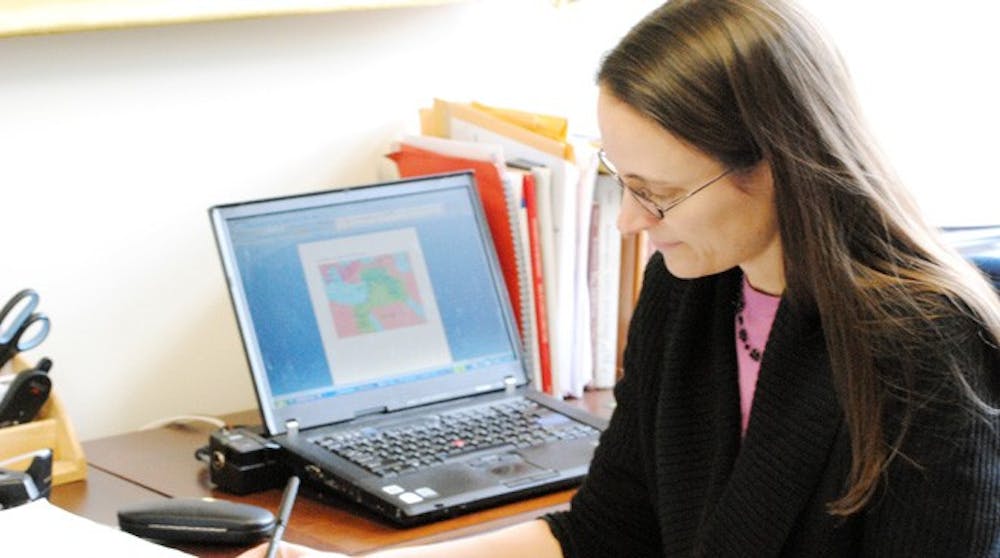Elizabeth Baughan, assistant professor of classics and archaeology at the University of Richmond, will be a non-residential fellow at the Center for Hellenic Studies for 2010-2011.
The center is located in Washington, D.C. and is associated with Harvard University. Baughan will have access to Harvard's extensive library resources, as well as travel support to conduct research at the center.
The center is a great spot in the middle of the district, said Julie Laskaris, a classics professor at Richmond and previous fellow. It is on several hundred acres of land by Rock Creek Park, where wildlife, such as deer and foxes, can be seen.
The center has a fantastic library, Laskaris said. Once a person becomes a fellow, he or she is a fellow for life and can return at any time to use the library.
Fellows work on their research at the center, and are given funding so they have their time available to devote to research, she said.
The center offers both residential and non-residential fellowships to scholars working on various aspects of ancient Greek civilization, according to its Web site.
Non-residential fellows are provided with varying levels of financial support depending on their proposals and needs, according to the Web site.
Baughan will research and write the final chapters of her coming book. Her work is the first comprehensive study of funeral couches and their social and cultural significance in the area that is now Turkey.
Baughan said ancient funeral couches were burial places and made of stone to replicate wooden furniture of the type used during Greek and Roman antiquity.
The funeral beds Baughan researches replicate the wooden couches that were used for dining. This type of burial was popular when Anatolia was part of the Persian Empire.
Baughan became interested in the couches during an excavation near Turkey. The work gave her the idea for her thesis about funerary couches in Anatolia.
The couches had never thoroughly been collected and studied, and Baughan said she wanted to research where the idea for funeral couches came from and its significance.
Enjoy what you're reading?
Signup for our newsletter
"My focus is on the origins and significance [of couches] as a marker of elite and cultural identity," she said.
People would recline while eating at banquets, so Baughan said she thought the couches might signify the belief that one continues banqueting after death, or that the couches may have identified the dead as people who had been elite enough to attend banquets.
Before Baughan's work, it had been argued that the couches must be a Persian custom, but Baughan has researched couches that predate the era of the Persian Empire.
Baughan is in her third year at Richmond and previously taught at Trinity College.
"She's just a really great colleague to have, a wonderful addition to the department," Laskaris said. "She does fantastic work and has excited so many students about archaeology. She's just a delight."
Baughan's research began as her dissertation in graduate school at the University of California, Berkeley.
"Since then I've just been doing more and more research," she said. "I applied [for the fellowship] because it's a research institution that is close by, so I can stay in Richmond with my family but be a part of the academic center, a researcher and a fellow, part of a community of scholars," she said. "I'll probably go up once a week to work for the day or stay overnight."
Part of the application process for fellowships included writing a proposal about the work applicants hoped to accomplish at the center, writing a statement of career goals and submitting recommendation letters. Baughan was notified in December that she had been selected as a fellow.
According to the center's Web site: "The center will fund proposals that (a) show scholarly promise as indicated by the merits of the project, (b) demonstrate the capability of the researchers to achieve the proposed outcomes as reflected in their academic records, prior publications and supporting letters, and achieve results that will have a broad impact both on the immediate field and on the humanities in general."
Baughan said she looked forward to working with more professionals in her field of study.
"It's exciting for me to become a part of this scholarly community," she said. "From what I understand it's sort of like a family in that you develop strong bonds with other fellows."
The fellowship with the center is special because many fellowships in the United States are only open to Americans, but this fellowship is available for international scholars as well, Laskaris said.
Baughan will continue to teach at Richmond after her fellowship.
"Hopefully I can use the funding to take leave to finish my book," she said. "Then I look forward to getting back to teaching."
Contact staff writer Ashley Graham at ashley.graham@richmond.edu.
Support independent student media
You can make a tax-deductible donation by clicking the button below, which takes you to our secure PayPal account. The page is set up to receive contributions in whatever amount you designate. We look forward to using the money we raise to further our mission of providing honest and accurate information to students, faculty, staff, alumni and others in the general public.
Donate Now


